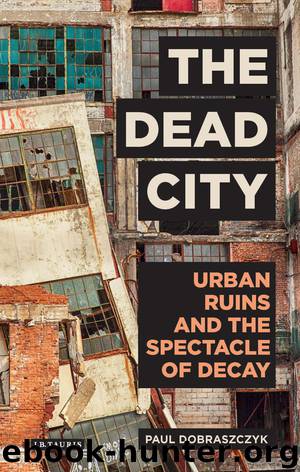The Dead City by Dobraszczyk Paul;

Author:Dobraszczyk, Paul;
Language: eng
Format: epub
Publisher: I.B.Tauris
Ruins as voids
The disasters at Chernobyl and, more recently, Fukushima in March 2011, underscore the fact that, with nuclear power, failure has been, and continues to be, an unthinkable option for those who implement it, despite the abundant evidence that failures do indeed occur.77 It is this official inability to think through nuclear failure that has resulted in the proliferation of symbolic representations of the Chernobyl disaster and its ruins. For this sociological ‘blind-spot’ is a void – an absence, caused by trauma, that lies at the heart of all responses to the Chernobyl disaster, whether from its direct victims, Chernobyl tourists, artists, game-players or filmmakers. As demonstrated in this chapter, catastrophic memories like those of Chernobyl can be subject to dramatic mutations that confound any attempt to articulate overarching narratives of disasters and their continuing legacies.78 In this context, the notion of ruins as ‘voids’ is an instructive tool by which we might read Chernobyl’s ruins. If these ruins are monuments, they are monuments to a catastrophic event that profoundly destabilized the prevailing symbolic order.79 As testified time and again by Chernobyl’s ‘witnesses’, the disaster ruptured symbolic worlds, exposing voids that could not be filled. As literary critic Andreas Huyssen has argued, all sites of trauma (as ruins) point to ‘an absence that can never be overcome’, but an absence that nevertheless must be acknowledged if healing is to take place.80 In a site like Chernobyl, where ruin has overtaken the entire environment, such voids become all pervasive: petrified remainders of an overwhelming trauma that challenge any desire to forget.
The sheer multiplicity of representations of Chernobyl and Pripyat examined in this chapter are testimony to the disaster’s global reach and the potent desire to circle or fill its voids, whether seen in the thousands of texts that have documented the scientific and social effects of the accident; oral testimonies of Chernobyl’s ‘sufferers’; monuments and museums dedicated to the memory of the accident and its victims; countless photographs by tourists and urban explorers; art works that engage a variety of media; computer games and films that appropriate Chernobyl’s abandoned spaces; and websites that seek to engage with what they regard as authentic memories of the accident. Perhaps, rather than pitting one set of voices against others, what is needed is a critical approach that brings together these conflicting representations, opening up a space of dialogue between Chernobyl’s contested histories and addressing the wider question of how the ruins of disaster might be remembered. In the wake of the nuclear disaster at Fukushima in 2011, there is an urgent need to re-engage with the cultural memory of Chernobyl, one that draws its disparate representations together in solidarity rather than hostility.
Download
This site does not store any files on its server. We only index and link to content provided by other sites. Please contact the content providers to delete copyright contents if any and email us, we'll remove relevant links or contents immediately.
| Anthropology | Archaeology |
| Philosophy | Politics & Government |
| Social Sciences | Sociology |
| Women's Studies |
Nudge - Improving Decisions about Health, Wealth, and Happiness by Thaler Sunstein(7687)
The Fire Next Time by James Baldwin(5421)
iGen by Jean M. Twenge(5401)
Adulting by Kelly Williams Brown(4560)
The Sports Rules Book by Human Kinetics(4374)
The Hacking of the American Mind by Robert H. Lustig(4361)
The Ethical Slut by Janet W. Hardy(4235)
Captivate by Vanessa Van Edwards(3834)
Mummy Knew by Lisa James(3676)
In a Sunburned Country by Bill Bryson(3526)
The Worm at the Core by Sheldon Solomon(3475)
Ants Among Elephants by Sujatha Gidla(3454)
The 48 laws of power by Robert Greene & Joost Elffers(3216)
Suicide: A Study in Sociology by Emile Durkheim(3009)
The Slow Fix: Solve Problems, Work Smarter, and Live Better In a World Addicted to Speed by Carl Honore(3001)
The Tipping Point by Malcolm Gladwell(2900)
Humans of New York by Brandon Stanton(2860)
Handbook of Forensic Sociology and Psychology by Stephen J. Morewitz & Mark L. Goldstein(2691)
The Happy Hooker by Xaviera Hollander(2682)
